七年级英语时态汇总一般现在时一般过去时和现在进行时
七年级英语上册时态知识点
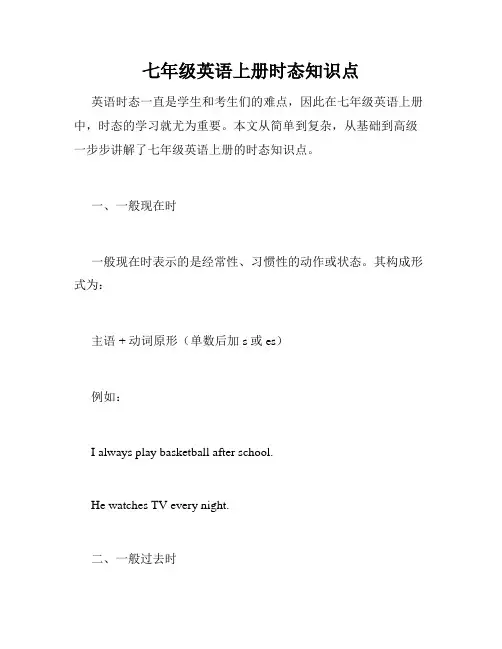
七年级英语上册时态知识点英语时态一直是学生和考生们的难点,因此在七年级英语上册中,时态的学习就尤为重要。
本文从简单到复杂,从基础到高级一步步讲解了七年级英语上册的时态知识点。
一、一般现在时一般现在时表示的是经常性、习惯性的动作或状态。
其构成形式为:主语 + 动词原形(单数后加 s 或 es)例如:I always play basketball after school.He watches TV every night.二、一般过去时一般过去时表示的是过去某个时间里发生的动作或状态。
其构成形式为:肯定句:主语 + 过去式否定句:主语+ didn’t + 动词原形(didn’t 即 did not 的缩写,代表否定的意思)疑问句:Did + 主语 + 动词原形例如:肯定句:I went to New York last summer.否定句:She didn’t come to the party.疑问句:Did Tom study for the test yesterday?三、一般将来时一般将来时表示的是将来某个时间里发生的动作或状态。
其构成形式为:主语 + will + 动词原形例如:I will visit my grandparents next weekend.She will go to the movies with her friends tonight.四、现在进行时现在进行时表示的是现在正在进行的动作。
其构成形式为:主语 + am / is / are + 现在分词例如:I am watching TV now.They are playing soccer in the yard.五、现在完成时现在完成时表示的是过去某个时间以来一直持续到现在的动作或状态。
其构成形式为:主语 + have / has + 过去分词例如:I have studied English for three years.He has been sick for a week.六、过去进行时过去进行时表示的是过去某个时间正在进行的动作。
七年级英语时态汇总一般现在时一般过去时和现在进行时
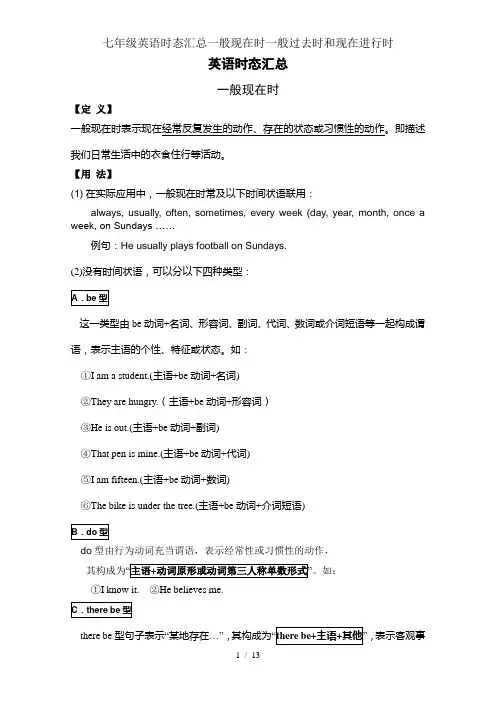
英语时态汇总一般现在时【定义】一般现在时表示现在经常反复发生的动作、存在的状态或习惯性的动作。
即描述我们日常生活中的衣食住行等活动。
【用法】(1) 在实际应用中,一般现在时常及以下时间状语联用:always, usually, often, sometimes, every week (day, year, month, once a week, on Sundays ……例句:He usually plays football on Sundays.(2)没有时间状语,可以分以下四种类型:这一类型由be动词+名词、形容词、副词、代词、数词或介词短语等一起构成谓语,表示主语的个性、特征或状态。
如:①I am a student.(主语+be动词+名词)②They are hungry.(主语+be动词+形容词)③He is out.(主语+be动词+副词)④That pen is mine.(主语+be动词+代词)⑤I am fifteen.(主语+be动词+数词)⑥The bike is under the tree.(主语+be动词+介词短语)do型由行为动词充当谓语,表示经常性或习惯性的动作,其构成为。
如:①I know it. ②He believes me.there be型句子表示“某地存在…”,其构成为,表示客观事实。
用法遵循,即主语是单数或并列主语中的第一个主语是单数,则用there is;主语是复数或并列主语中的第一个主语是复数,则用there are。
如:(1)There is an eraser on the teacher's desk.(主语an eraser是单数)(2)There is an orange,five apples and eight bananas in the bag.(并列主语中的第一个主语an orange是单数)情态动词型句子的构成为,情态动词和动词原形一起构成谓语,表示说话人对所叙述的动作或状态的看法。
初一英语时态总结

初一英语时态总结一、一般现在时态(Simple Present Tense)1. 表示经常性或习惯性的动作、状态或真理。
例句:I often go to school by bus.(我经常坐公交车去学校。
) Water boils at 100 degrees Celsius.(水在100摄氏度时沸腾。
)2. 表示客观事实、科学真理或普遍规律。
例句:The sun rises in the east.(太阳从东方升起。
)Water freezes at 0 degrees Celsius.(水在0摄氏度时结冰。
) 3. 表示主语的特性或个人喜好。
例句:She likes playing basketball.(她喜欢打篮球。
)He is a smart boy.(他是个聪明的男孩。
)二、一般过去时态(Simple Past Tense)1. 表示过去某个时间发生的动作或状态。
例句:I went to the park yesterday.(我昨天去了公园。
) They lived in China when they were young.(他们年轻时住在中国。
)2. 表示过去的习惯或经常性动作。
例句:We used to play soccer every weekend.(我们过去每个周末都踢足球。
)She always studied until late at night.(她过去总是学习到很晚。
)3. 表示过去的真理或规律。
例句:Dinosaurs existed millions of years ago.(恐龙存在于几百万年前。
)The Earth was flat according to ancient beliefs.(根据古代的信仰,地球是平的。
)三、一般将来时态(Simple Future Tense)1. 表示将来某个时间或在某个时间之后发生的动作或状态。
例句:I will visit my grandparents next week.(下周我会去看望我的祖父母。
七年级上册英语时态归纳
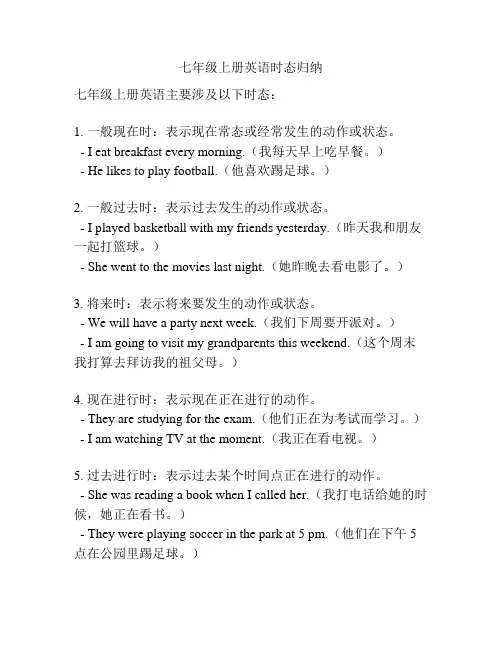
七年级上册英语时态归纳七年级上册英语主要涉及以下时态:1. 一般现在时:表示现在常态或经常发生的动作或状态。
- I eat breakfast every morning.(我每天早上吃早餐。
)- He likes to play football.(他喜欢踢足球。
)2. 一般过去时:表示过去发生的动作或状态。
- I played basketball with my friends yesterday.(昨天我和朋友一起打篮球。
)- She went to the movies last night.(她昨晚去看电影了。
)3. 将来时:表示将来要发生的动作或状态。
- We will have a party next week.(我们下周要开派对。
)- I am going to visit my grandparents this weekend.(这个周末我打算去拜访我的祖父母。
)4. 现在进行时:表示现在正在进行的动作。
- They are studying for the exam.(他们正在为考试而学习。
) - I am watching TV at the moment.(我正在看电视。
)5. 过去进行时:表示过去某个时间点正在进行的动作。
- She was reading a book when I called her.(我打电话给她的时候,她正在看书。
)- They were playing soccer in the park at 5 pm.(他们在下午5点在公园里踢足球。
)6. 现在完成时:表示过去发生的动作与现在产生的影响或结果。
- I have finished my homework.(我已经完成了我的作业。
)- She has lived in this city for ten years.(她在这个城市已经住了十年了。
)这些是七年级上册英语的主要时态,通过学习这些时态,你将能够更好地理解和运用英语语法。
初一英语四种时态讲解
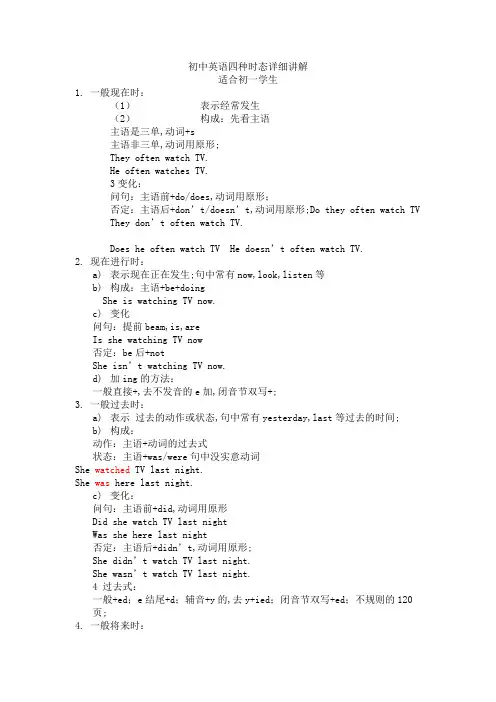
初中英语四种时态详细讲解适合初一学生1.一般现在时:(1)表示经常发生(2)构成:先看主语主语是三单,动词+s主语非三单,动词用原形;They often watch TV.He often watches TV.3变化:问句:主语前+do/does,动词用原形;否定:主语后+don’t/doesn’t,动词用原形;Do they often watch TV They don’t often watch TV.Does he often watch TV He doesn’t often watch TV.2.现在进行时:a)表示现在正在发生;句中常有now,look,listen等b)构成:主语+be+doingShe is watching TV now.c)变化问句:提前beam,is,areIs she watching TV now否定:be后+notShe isn’t watching TV now.d)加ing的方法:一般直接+,去不发音的e加,闭音节双写+;3.一般过去时:a)表示过去的动作或状态,句中常有yesterday,last等过去的时间;b)构成:动作:主语+动词的过去式状态:主语+was/were句中没实意动词She watched TV last night.She was here last night.c)变化:问句:主语前+did,动词用原形Did she watch TV last nightWas she here last night否定:主语后+didn’t,动词用原形;She didn’t watch TV last night.She wasn’t watch TV last night.4 过去式:一般+ed;e结尾+d;辅音+y的,去y+ied;闭音节双写+ed;不规则的120页;4.一般将来时:a)表示:将来 ,句中有表示将来的时间:tomorrow、next、soon,in twodays等b)构成A:主语+will+do任何人称B:主语+shall+do仅第一人称I,weC:主语+be going to +do 如:A:She will watch TV this evening.B:We shall watch TV this evening.C:She is going to watch TV this evening.c)变化问句:提前will/shall/beA:Will she watch TV this…B: Shall we watch TV …C: Is she going to watch …否定:在will /shall/be 后+notA: She won’t watch TV…B: We shall not watch… shan’tC: She isn’t going to watch…There is a meeting next week.There was a meeting yesterday.There will be a meeting next…=There is going to be a meeting next …。
七年级上册英语时态归纳
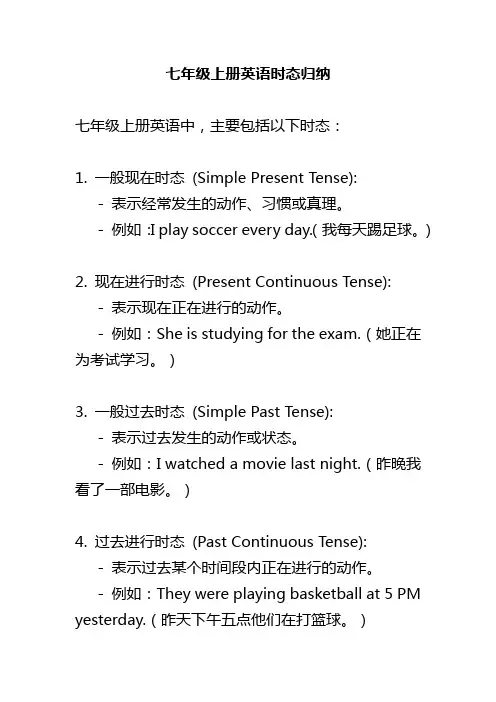
七年级上册英语时态归纳
七年级上册英语中,主要包括以下时态:
1. 一般现在时态(Simple Present Tense):
- 表示经常发生的动作、习惯或真理。
- 例如:I play soccer every day.(我每天踢足球。
)
2. 现在进行时态(Present Continuous Tense):
- 表示现在正在进行的动作。
- 例如:She is studying for the exam.(她正在为考试学习。
)
3. 一般过去时态(Simple Past Tense):
- 表示过去发生的动作或状态。
- 例如:I watched a movie last night.(昨晚我看了一部电影。
)
4. 过去进行时态(Past Continuous Tense):
- 表示过去某个时间段内正在进行的动作。
- 例如:They were playing basketball at 5 PM yesterday.(昨天下午五点他们在打篮球。
)
5. 一般将来时态(Simple Future Tense):
- 表示将来发生的动作或状态。
- 例如:We will go to the beach tomorrow.(明天我们将去海滩。
)
6. 将来进行时态(Future Continuous Tense):
- 表示将来某个时间段内正在进行的动作。
- 例如:He will be studying all night.(他将整晚都在学习。
)。
七年级上下册学过的时态
七年级上下册学过的时态七年级上下册学习过的时态可以分为以下几种:一、一般现在时一般现在时表示习惯、经常性的动作或现在的状况,例如:"I usually go to school at 7:30."(我通常七点半去学校)。
二、现在进行时现在进行时表示现在正在发生的动作,例如:"I am writing an article right now." (我在写一篇文章)。
三、一般过去时一般过去时表示过去发生的动作或经历,例如:"I played basketball last night." (我昨天晚上打篮球了)。
四、过去进行时过去进行时表示过去某一时间正在发生的动作,例如:"I was watching TV at 8:00 yesterday evening."(昨天晚上八点的时候我正在看电视)。
五、一般将来时一般将来时表示将来会发生的动作或情况,例如:"I will go to Beijing next week."(下周我会去北京)。
六、将来进行时将来进行时表示将来某一时间正在发生的动作,例如:"This time next week, I will be studying for the final exam."(下周这个时间,我会在为期末考试而学习)。
七、现在完成时现在完成时表示过去发生的动作对当前有影响或仍在持续,例如:"I have studied English for 3 years."(我学了三年英语了)。
八、过去完成时过去完成时表示过去某一时间之前已经发生的动作,例如:"I had finished my homework before my parents came back."(在我父母回来之前,我已经完成了作业)。
七年级全册时态知识点
七年级全册时态知识点时态是语法学习中非常重要的一个部分,是用来表达动作发生的时间和状态的一种语法形式。
在英语学习中,时态的正确使用非常重要,因为时态能够帮助我们更好地表达我们想要表达的意思。
在七年级的英语学习中,学生需要掌握一些基本的时态知识点,下面就让我们来详细了解一下这些知识点。
一、一般现在时一般现在时表示目前正在发生的事情或者经常发生的事情。
在句子中,一般现在时的动词不需要加s或es。
例如:I eat lunch at 12 o'clock every day.(我每天中午12点吃午饭。
)He plays basketball every weekend.(他每个周末打篮球。
)二、一般过去时一般过去时表示过去发生的动作或者状态。
在句子中,一般过去时的动词需要加ed。
例如:I watched TV last night.(昨晚我看了电视。
)She studied English for two hours yesterday.(她昨天学习英语两个小时。
)三、一般将来时一般将来时表示将要发生的事情。
在句子中,一般将来时需要使用will或者be going to。
例如:I will go to the movie theater tomorrow.(我明天会去电影院。
)He is going to visit his grandparents next weekend.(他下个周末去看望他的祖父母。
)四、现在进行时现在进行时表示目前正在进行中的动作。
在句子中,现在进行时需要使用be动词加动词ing。
例如:I am studying for the test right now.(我现在正在为考试学习。
)She is watching a movie at home.(她正在家里看电影。
)五、过去进行时过去进行时表示过去某个时刻正在进行的动作。
在句子中,过去进行时需要使用was或were加动词ing。
七年级英语时态归纳总结
七年级英语时态归纳总结
在英语中,时态是通过动词的变化来表示不同的时间概念的。
下面是七年级英语中常见的几种时态:
1. 一般现在时:表示经常发生的动作或存在的状态,通常与often, usually, always等频度副词连用。
2. 一般过去时:表示在过去某个时间发生的动作或存在的状态,通常与yesterday, last week, in 2005等时间状语连用。
3. 现在进行时:表示正在进行的动作或最近的情况,通常与now, at the moment, these days等时间状语连用。
4. 过去进行时:表示在过去某一时刻或某一时间段内正在发生的动作,通常与at that time, yesterday afternoon, all day yesterday等时间状语连用。
5. 一般将来时:表示将要发生的动作或存在的状态,通常与tomorrow, next week, in the future等时间状语连用。
6. 过去将来时:表示在过去某一时刻看将要发生的动作或存在的状态,通常与then, tomorrow, next week等时间状语连用。
七年级时态英语知识点总结
七年级时态英语知识点总结七年级时态英语知识点总结英语时态是英语语法体系中的重要组成部分,学习好时态的使用是学好英语的关键之一。
在七年级的学习过程中,我们初步了解了英语的基本时态,为今后的英语学习打下了坚实的基础。
下面我将对七年级学过的时态知识点进行总结。
一、一般现在时一般现在时表示经常性的、反复发生的动作或状态。
它的基本形式是主语+动词原形。
例如:"I like playing soccer."(我喜欢踢足球。
)1. 一般现在时的肯定句中,第三人称单数形式的动词要加-s。
例如:"She likes swimming."(她喜欢游泳。
)2. 一般现在时的否定句是在助动词do后加not,再加动词原形。
例如:"They do not eat meat."(他们不吃肉。
)3. 一般现在时的疑问句是将助动词do提到句子的最前面。
例如:"Do you like ice cream?"(你喜欢冰淇淋吗?)二、一般过去时一般过去时表示过去某个时间发生的动作或状态。
它的基本形式是主语+动词的过去式。
例如:"I watched a movie last night."(昨晚我看了一部电影。
)1. 一般过去时的肯定句中,动词一般要变为过去式,规则变化为动词原形的过去式形式。
例如:"They played basketball yesterday."(他们昨天打篮球。
)2. 一般过去时的否定句是在助动词did后加not,再加动词原形。
例如:"I did not finish my homework."(我没有完成作业。
)3. 一般过去时的疑问句是将助动词did提到句子的最前面。
例如:"Did you go to the park yesterday?"(你昨天去公园了吗?)三、一般将来时一般将来时表示将要发生的动作或状态。
- 1、下载文档前请自行甄别文档内容的完整性,平台不提供额外的编辑、内容补充、找答案等附加服务。
- 2、"仅部分预览"的文档,不可在线预览部分如存在完整性等问题,可反馈申请退款(可完整预览的文档不适用该条件!)。
- 3、如文档侵犯您的权益,请联系客服反馈,我们会尽快为您处理(人工客服工作时间:9:00-18:30)。
七年级英语时态汇总一般现在时【定义】一般现在时表示现在经常反复发生的动作、存在的状态或习惯性的动作。
即描述我们日常生活中的衣食住行等活动。
【用法】(1)在实际应用中,一般现在时常与以下时间状语联用:always, usually, often, sometimes, every week (day, year, month, once a week, on Sundays ……例句:He usually plays football on Sundays.(2)没有时间状语,可以分以下四种类型:A.be型这一类型由be动词+名词、形容词、副词、代词、数词或介词短语等一起构成谓语,表示主语的个性、特征或状态。
如:①I am a student.(主语+be动词+名词)②They are hungry.(主语+be动词+形容词)③He is out.(主语+be动词+副词)④That pen is mine.(主语+be动词+代词)⑤I am fifteen.(主语+be动词+数词)⑥The bike is under the tree.(主语+be动词+介词短语)B.do型do型由行为动词充当谓语,表示经常性或习惯性的动作,【结构】主语+动词原形+宾语即某人+某个动词+其他。
如果有,只要在be动词或情态动词后面加上not。
如果句子中没有be动词(is, am 或者are)或情态动词(can)那么根据主语在后面加入don’t(you, I或者复数)或【口诀】当主语是第三人称单数时肯定句主语+动词三单+其他否定句主语+doesn't+动词原形+其他一般疑问句Does+主语+动词原形+其他肯定回答Yes,主语+does否定回答No,主语+doesn't特殊疑问句特殊疑问词+一般疑问句当主语不是第三人称单数时肯定句主语+动词原形+其他否定句主语+don't+动词原形+其他一般疑问句Do+主语+动词原形+其他用错结构全句都错,一定要注意。
【第三人称单数变化规律】【练习】1. Jim __________(be) a hard-working student at school.2. __________(be) Tom and Sam in the same class?3. Your school life __________(be) very interesting.4. There __________(be) a pen, two rulers and some books on the desk.5. The boys __________(be) very friendly to me.6. Maria __________(be not) from the U.S.A.7. __________(be) there any trees and a pool in the yard?8. I want to __________(be) a teacher.9. Mr. Wang can’t __________(be) at home, because the lights are off.10. Don’t __________(be) late for school again.1. My mom can __________(cook) food well.2. Must she __________(stay) at home now?3. What can the boy __________(do) for his parents?4. Tom can’t __________(sing) an English song.5. He may __________(perform) ballet at Kangkang’s birthday party.6. She should __________(help) her parents do some housework.三、用所给词的适当形式填空。
(实义动词)1. Tom often __________(take) a talk after supper.2. Tom and I usually __________(go) to school by bike.3. Does Lin Tao __________(like) reading storybooks?4. What classes do you __________(have) today?5. How often does the girl __________(watch) TV?6. Where do they __________(live) now?7. Every year many people __________(lose) their lives in traffic accidents.8. Sam doesn’t __________(get) up early in the morning.9. Each of them __________(have) a nice schoolbag.10. They each __________(sleep) late at night.1. She is in a blue dress.(变否定句)She __________ __________ a blue dress.2. I am from Qijiang.(变一般疑问句)__________ __________ from Qijiang?3. Are the storybooks very interesting?(否定回答)No, __________ __________.4. His parents are both workers.(变一般疑问句)__________ his parents __________ workers?5. There are some nice books on the shelf.(对划线部分提问)__________ __________ on the shelf?1. My mother may speak a little English.(变否定句)My mother __________ __________ speak a little English.2. We should be careful when we cross the street.(变一般疑问句)__________ __________ be careful when we cross the street?3. Must I finish my homework at once?(作肯定和否定回答)Yes, __________ __________.No, __________ __________.4. Tom can recite a Chinese poem.(对划线部分提问)What __________ Tom __________?1. They often play the piano loudly.(变否定句)They __________ often __________ the piano louldy.2. Jim learns English well.(变一般疑问)__________ Jim __________ English well?3. She likes Sichuan food very much.(对划线部分提问)What __________ she __________ very much?4. Do the boys usually play football after school?(作肯定回答)Yes, __________ __________.5. She usually does some cooking in the evening.(变否定句)She usually __________ __________ any cooking in the evening.6. I want to do some shopping.(变一般疑问句)__________ you __________ to do any shopping?7. Tom often wathes TV at night.(对划线部分提问)What __________ Tom often __________ at night?8. They sometimes go swimming in the afternoon.(对划线部分提问)What __________ they sometimes __________ in the evening?一般过去时【定义】一般过去时表示过去某个时间发生过了的动作或存在过的状态。
即描述已经发生过了的事情。
【用法】A.be型这一类型由be动词(was和were)+名词、形容词、副词、代词、数词或介词短语等一起构成谓语,表示主语以前或过去的个性、特征或状态。
如:①I was a student ten years ago.(主语+be动词+名词)②They were hungry just now.(主语+be动词+形容词)③The bike was under the tree yesterday.(主语+be动词+介词短语)④It was rainy last Sunday.⑤’s birthday party.B.情态动词型情态动词型句子的构成为,情态动词过去式和动词原形一起构成谓语,表示主语过去或曾经能做的事情。
如:①He could speak a little English last year.(could+speak)②What could she do when he was ten.C.did型【结构】主语+动词过去式+宾语即某人+某个动词过去式+其他。
如果有,只要在be动词或情态动词后面加上not。
如果句子中没有be动词(wasdoing, where … going, what … do),然后找句子中有没有be动词(was或者were)或情态动词(could),如果有,只要将be动词或情态动词提前,放到主语前面。
注意:句中第一人称和第二人称要互换。
如果句子中没有be动词(was 或者were)或情态动词(could)那么在主语之前加入did。
